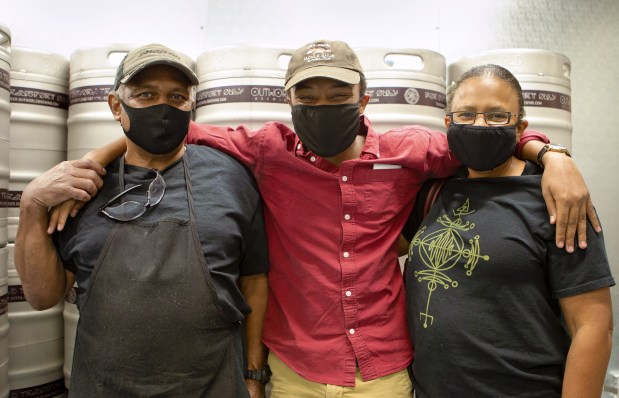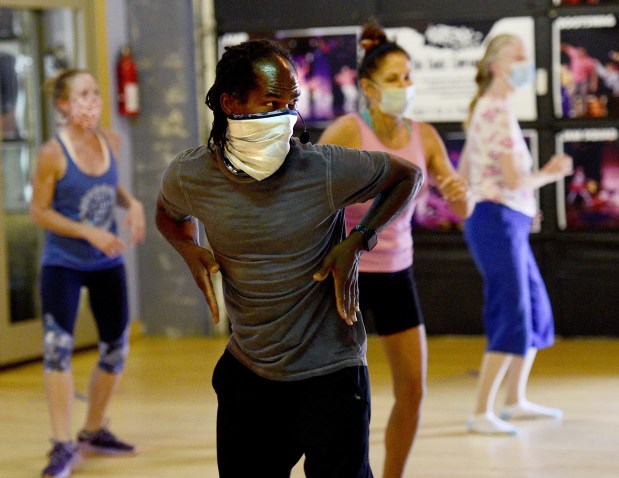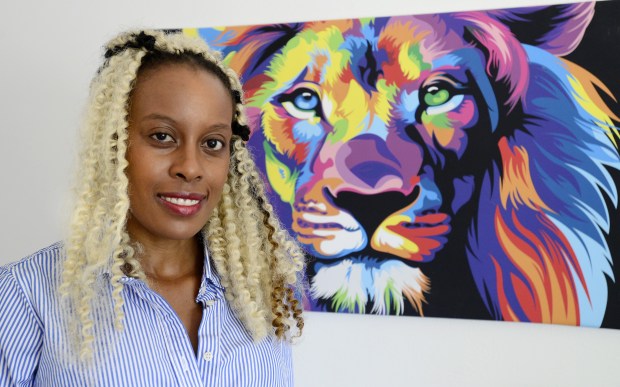Aaron Clark, CEO and founder of Equity Solutions LLC, set out to find Black and African-American owned or managed businesses in the Boulder Valley. After compiling a still-growing list of 50 businesses, he said it’s time for local allies to put their money where their mouths are.
In light of the Black Lives Matter movement, lists of Black-owned businesses for cities across the U.S. have popped up to encourage patronizing those establishments. Since June, a list of more than 400 businesses in and around Denver by 303 Magazine has been shared on social media 148,000 times among Facebook, Twitter, Pinterest and Reddit, according to the publication’s website.
Clark is a Black business owner himself. He founded the Boulder-based consulting firm Equity Solutions, which offers corporate diversity, equity and inclusion training.
He decided to build a record for Boulder County by speaking with locals on Twitter. At first, identifying businesses was not easy.
“We only came up with two or three, maybe four, among the small thread with some folks on Twitter,” Clark said. “And then I decided I’m going to change this. I’m going to fix this problem. I want to know where every business is at.”
Equity Solutions partnered with the Boulder County chapter of the NAACP. The Boulder County Black-Owned List is available for view on the Boulder County NAACP website.
Clark believes that there are a lot more Black-owned businesses in the county beyond the list. He said that to support businesses operated or owned by minority groups means asking the “hard questions.” In other words, asking a business owner if he or she is a person of color.
“Because of that fear of asking, there was never really any way to aggregate who is actually here and how we then support these communities,” Clark said.
An interest in patronizing Black-owned businesses took off after protests erupted across the country in late May and early June, after George Floyd’s death on May 25. On Instagram, 1.8 million photos use the hashtag #buyBlack and #Blackowned.
A poll in recognition of National Black Business Month — which ends Aug. 31 — by Groupon (Nasdaq: GRPN) and the National Black Chamber of Commerce found that 75% of U.S. Black small businesses have seen an uptick in customers since the beginning of June. The survey saw more than 400 respondents.
The increase in sales, stemming from tragic events, falls within the same timeline of the COVID-19 pandemic. Black-owned small businesses have shuttered at higher rates than any other ethnic group. In a June-published study, the National Bureau of Economic Research reported that 41% of Black small businesses were forced to close permanently due to COVID-19, compared with 17% of white-owned businesses.
Clark leads the equity initiative for Energize Colorado, a collective of leaders from Colorado’s business and not-for-profit sectors that helps local businesses that have seen fallout from the coronavirus pandemic. He said that the organization is working toward finding local data on how minority-owned businesses have been impacted.
Barriers to establishing Black-owned businesses in Boulder County are the cost of entry and access to capital, said Jude Landsman, chair of the NAACP Economic Opportunity Committee for Boulder County. She said that the retention of businesses reflects the resident community.
Boulder County’s population leans heavily toward white at 90%, according to the U.S. Census Bureau. Less than 2% of residents are Black or African American. The largest non-white population is Hispanic or Latino at 14%.
“To support Black businesses is a way, certainly, to promote the establishment of a Black community here,” Landsman said.
Outworld Brewing
Some businesses in the Boulder region see benefits from non-Black allies offering support through their wallets. But it can also lead to feeling “othered.”
Outworld Brewing in Longmont, which is registered under Tappist Munks LLC, is one of three Black-owned breweries in the state, according to reporting from the Times-Call earlier this month. It is in the Weld County part of Longmont. It is also an identified business from the Equity Solutions Boulder County Black-Owned List.

But Brenda Fuller, chief administrative officer of Outworld Brewing and whose husband, Brian, owns the brewery, doesn’t want customers to come in just because the business is Black-owned.
“We are a brew pub that serves great food, great beer has an excellent experience, and we happen to be Black-owned,” Fuller said. “We don’t put that first because we don’t want people coming here just because we’re Black, because there’s so much more.”
Outworld has two stories to tell. One is an imagined backstory for the Longmont brewery, filled with space travel and mystery. The other is of a family that created a business together where every member could share their talents, from brewing, cooking, art and music.
Many in the Fuller family are sci-fi fans. Beyond serving original brews and bites, Outworld has its own narrative, which is influenced by Frank Herbert’s novel “Dune.” The brew pub is an interstellar trading post that a made-up society, the Tappist Munks, crashed long ago. In this universe, beer is the highest commodity, and the Tappist Munks will share their secrets to brewing and their history with customers.
Over time, the brewery will leave hints about the story for customers on social media or around the brewpub, said Jeremy Williams, nephew of Fuller, assistant brewer and co-creator of the Outworld story. Outworld has its own alphabet that guests must decode.
Williams and Fuller are part of nine family members who work for or have contributed to Outworld Brewing. The labor of love has taken more than two years to build out, opening in February.
“We decided to bring together our desire to have a business, our love for food, our love for entertaining and beer,” Fuller said.
Outworld is participating in the Black Is Beautiful initiative, a nationwide collective of more than 1,000 independent breweries that are raising money for organizations that work toward anti-racism causes. Every brewery puts its own twist on an imperial stout and uses the same label that reads, “Black Is Beautiful.” Outworld’s version is a cocoa, mandarin imperial stout available on tap and to-go in a 32-ounce crowler. Half of the proceeds from the brew will go to the YWCA, a nonprofit with with a mission is to eliminate racism and empower women.

Streetside Dance
Rico Changeux, owner and dance instructor for Streetside Studios LLC, also known as Streetside Dance, said that something he noticed when he first moved to Boulder in the early 2000s to teach dance at University of Colorado Boulder was the lack of diversity.
“I was like, What’s going on? Where’s the culture? Where’s the people?” Changeux said. “It wasn’t there at the moment. So I felt for me, Boulder was kind of like a bubble.”
Changeux said that he feels like he’s adding to the city’s culture through the art of dance. Streetside Dance has 22 instructors who teach hip hop, ballet, jazz, breakdance and various African dance classes. There are classes for any age group. There’s also a Streetside Dance company that runs for a nine-month season.
Before opening Streetside Dance about 11 years ago, Changeux worked as a self-taught professional dancer. He remembers watching Michael Jackson on TV when he was around 5 years old, attempting to mimic his dance moves.
Changeux moved to the San Francisco Bay Area from Haiti when he was still a child. Later as an adult, he relocated to Los Angeles and worked as a dancer or choreographer with several music artists including Dru Hill, Usher and Michael Jackson.
Due to COVID-19, Streetside Dance is open to in-person classes, with limited lessons and capacity for each room. Some virtual classes are also available.
Mini Money Management
Lorne Jenkins, co-founder and CEO of Ansala LLC, which does business as Mini Money Management, was raised in Longmont. After living in other places in the U.S. and the United Kingdom during his undergraduate and graduate studies, he returned to the city.
The startup Mini Money Management is an app that helps educators, educational institutions and families teach financial literacy to children. Children receive fake money and must learn how to pay bills on time, how to budget their income and earn money.
Jenkins was inspired by his mother, who taught him and his sister the value of the dollar at a young age. After becoming fed up with her children asking to go out to eat, Jenkins and his sister had to interview for the “positions of son and daughter.”
They were given a weekly allowance and were fined $3 for going out to eat. They were charged small fees for pretend rent, utilities and laundry. After time, they were no longer asking to eat out and saved their earnings for fun activities and picking up chores for extra income.
“It was a really good parenting tool for her,” Jenkins said. “It was no more yelling, no more grounding, no more screaming. It was just a fine.”
Growing up, he and his friends referred to the surrounding area as “the Boulder bubble.” Jenkins added that Boulder County is a nice place to live, but its residents can be oblivious to existing economic and racial inequities.
“I think that things are very, very good in Boulder and Boulder County as a whole. And I think that can create a very false sense of security,” he said.
Jenkins recalls pitching Mini Money Management at 1 Million Cups in Boulder in October 2019. The organization, formed by the Ewing Marion Kauffman Foundation, provides an opportunity for startups to pitch their ideas to investors.
During Jenkins’ presentation, one person asked why Mini Money Management also offered printable PDF sheets when it’s an internet app. Jenkins explained that for some schools in low-income neighborhoods, there’s not a one-to-one ratio of technology devices to students and that those are the children who need financial literacy the most. Jenkins said that the individual saw his comment as exclusionary and unfair to children from higher-income areas.
“I was like, ‘No, I want to teach all kids, but I think that the impact of teaching this kid is going to have a much bigger impact because impoverished and people of color aren’t taught these things. And people from low income areas aren’t taught these things,’” he said.
Lisbeth Joe
Leontyne Ashmore, founder and owner of Lisbeth Joe LLC, created a “barefoot shoe” fashion line after developing diastasis recti after giving birth to her second child. The condition involves separation of the large abdominal muscles and is common in postpartum women.
Ashmore works as a one-woman team out of her Boulder home.

Barefoot, or minimalist, shoes have a sole without any drop and are meant to mimic walking barefoot. Ashmore said that its ergonomic design treated the pain she experienced from her condition.
She said that she couldn’t find zero-drop shoes that fit her taste, especially for office wear. At the time, Ashmore was working in finance.
She said since being listed on the Equity Solutions Black-owned list, and a separate thread on NextDoor, she’s seen a slight uptick. Revenue comparisons, however, are difficult to quantify, as Lisbeth Joe just went to market this year.
Ashmore named the company after her mother. She describes her as a strong-natured single mom who had an eye for fashion. Her mother would sew and sell clothes to supplement the family’s income.
“She had real attention to detail,” Ashmore said. “Whatever she made was beautiful and you could just see an outfit in a magazine, and she would re-create it.”
Ashmore never thought that she’d follow her mother’s interests and create clothing herself. Working for herself, after years as an accountant, is challenging but she falls back on her driving passions whenever she feels discouraged: empowering other women. Ashmore wants to dedicate a portion of Lisbeth Joe’s sales to supporting women entrepreneurs through Kiva, a microlending nonprofit with U.S. offices in San Francisco, and Portland, Ore.
As a business owner, she doesn’t have to experience workplace discrimination. Ashmore recalls bidding for a job at an unnamed Boulder firm. She said that after a successful interview with the financial director and sales team, she was offered the job.
After the job offer, she went to meet the owner of the company with plans to join the whole staff for lunch afterward. The owner said insensitive race-based comments about keeping “one group in power,” Ashmore said. He also made odd remarks about colonization after learning that Ashmore was born in Zimbabwe.
The position was later withdrawn. She believes the position was taken off of the table because of racial discrimination. In addition to the high-cost of living in Boulder, equity hurdles in the workplace make it challenging for people of color to live in the city, she said.
“I definitely wouldn’t want to work for that company for sure, but the fact that these companies still exist makes that a barrier for people to live here,” Ashmore said.
Equity programs
Equity Solutions’ Black-owned business list is part of a larger diversity program. The firm is leading an initiative that helps match businesses and nonprofits with candidates who are people of color for board nominations.

“What’s exciting for me is that after George Floyd, there was an immediate conversation, especially in the tech and the startup VC world, around, ‘What does it really take to provide equity in the world?’” Clark said. “We need to have more voices — more Black and brown voices — in influential places. And one of those is at the board level.”
Equity Solutions has already collected a list of 20 candidates who are both qualified and interested in sitting on a board, Clark said. Another good place to look for nominees is the Equity Solutions Boulder County Black-owned Business List, he added.
The firm also vets companies and organizations that are interested in the program. Clark said that businesses must do the “internal work” to fight biases before diversifying the boardroom or staff. All too often, companies rely on people of color to fix workplace inequities, he said.
“What I’m telling Boulder companies that are trying to hire POCs is to stop. Don’t do that. Don’t try and hire Black and brown people and bring them into an environment that is not ready,” he said.
Landsman said that along with recruitment, retention of people of color is an issue. The NAACP of Boulder County is working on programs to address retention.
In June, the Boulder County NAACP launched a corporate membership and ambassador program. Corporate partners that participate in the ambassador program receive guidance toward inclusion policies. Every company in the program will receive hands-on, tailored training from NAACP volunteers, said Landsman.
So far, there are more than 12 companies in the ambassador program, she said. At the end of September or early October, the chapter will host an inaugural event for the project, “How to Talk About Race in Boulder County — Black Voices.”
The event will be virtual and facilitate conversations with the Boulder County business community by inviting current and prospective corporate members. The NAACP is still deciding on the date, time and speakers for the event, Landsman said.




